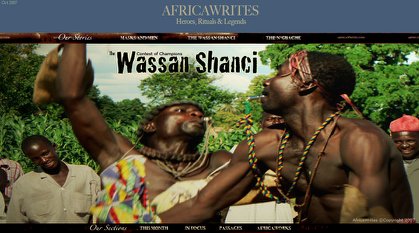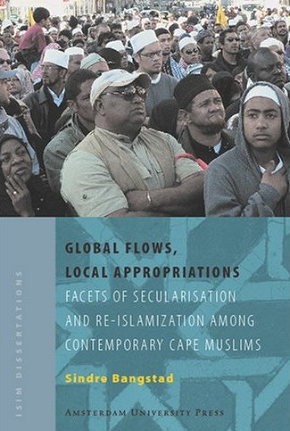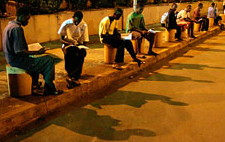Help out the Hadza, urges anthropology.net. A United Arab Emirates royal family is trying to use the land of the Hadza as a “personal safari playground”. After a helicopter tour, they have worked out an arrangement with the Tanzanian government to lease the land without consulting the Hadza.
Philip Marmo, a Tanzanian official, said that a nearby hunting area the royal family shared with relatives had become “too crowded” and that a member of the Abu Dhabi royal family “indicated that it was inconvenient” and requested his own parcel.
Marmo called the Hadzabe “backwards” and said they would benefit from the school, roads and other projects the UAE company has offered as compensation, according to the Washington Post. “We want them to go to school,” said Marmo. “We want them to wear clothes. We want them to be decent.”
Marmo is by the way Tanzania’s minister for good governance!
A similar agreement with another company resulted in dozens of Hadzabe men being arrested for hunting on their own land. Three of the men died of illness in the prison, three others died soon after being released.
>> read the whole story in the Washington Post
>> Comment by anthropologist Christopher O’Brien
Reading these stories and comments I am wondering why the focus is on “saving culture” and not on human rights or class?
The Washington Post starts the article with well known evolutionism:
One of the last remaining tribes of hunter-gatherers on the planet is on the verge of vanishing into the modern world.
And the journalist continues describing them as “backward” people. They “still make fire with sticks”, they “still hunt and gather as a way of life” and “avoid confrontation by fleeing into the bush”.
And of course they call them a “tribe”.
Maybe even worse: We find the same ethnocentric evolutionism among anthropologists. In the first post on this issue at anthropology.net Tim writes:
I wrote previously about mankind’s attempts to resurrect some faunal components of the Pleistocene, but here’s a story about mankind’s attempts to obliterate one of the last remaining hunter-gatherer societies that has survived (just about) to the present day.
(…)
We might expect the government of Tanzania to have some interest in preserving their cultural past. (….) There are various projects which seek to protect wildlife in Africa – for example there is a big, if not completely effective, anti-poaching drive to protect elephants from ivory hunters and traders – so why can we not protect human hunters and gatherers?
UPDATE (13.6.07): The Guardian (Tanzania) reports about earlier “violations of human rights against the Hadzabe ethnic group committed by social researchers, tour firms, filmmakers and some non-governmental organizations”:
There are claims that some of these groups have been inspecting the Hadzabe people`s private organs to determine their size for unknown reasons. They reportedly use a variety of strategies to convince the Hadzabe to undress for the purpose of having sexual intercourse, in attempt to photograph them while naked. (…) There are claims that tour operators are ferrying visitors to see the Bushmen`s primitive way of life and their environment, hence generate money while the Hadzabe themselves get nothing.
And according afrol.com international protests against the land-grab is growing. The case has now been presented to the UN Special Rapporteur on Human Rights and Fundamental Freedoms of Indigenous Peoples, Rodolfo Stavenhagen.
SEE ALSO:
Anthropologists condemn the use of terms of “stone age” and “primitive”
Our obsession with the notion of the primitive society
Primitive Racism: Reuters about “the world’s most primitive tribes”
“Stone Age Tribes”, tsunami and racist evolutionism
“Good story about cannibals. Pity it’s not even close to the truth”
Ancient People: We are All Modern Now – Debate on Savage Minds
Do anthropologists have anything relevant to say about human rights?




 Anthropologist Reining died July 19 at the age of 84. “Anthropologist Broke Ground on AIDS, Satellite Mapping”,
Anthropologist Reining died July 19 at the age of 84. “Anthropologist Broke Ground on AIDS, Satellite Mapping”, 